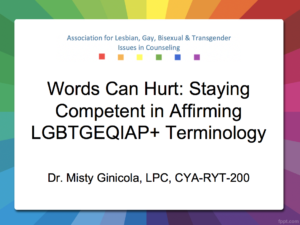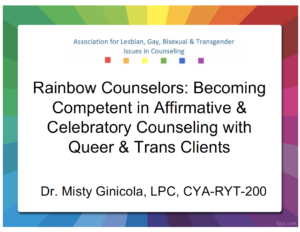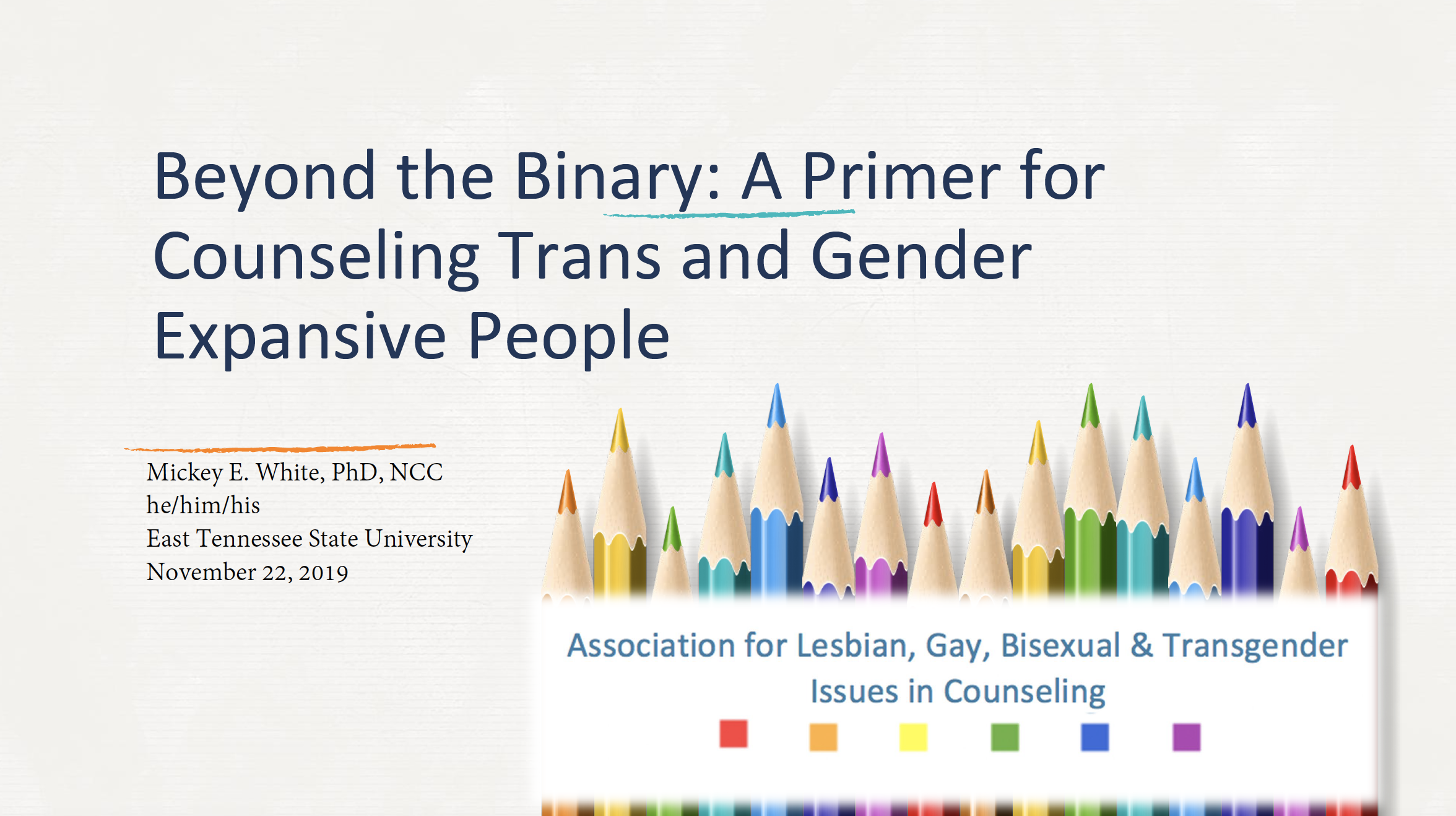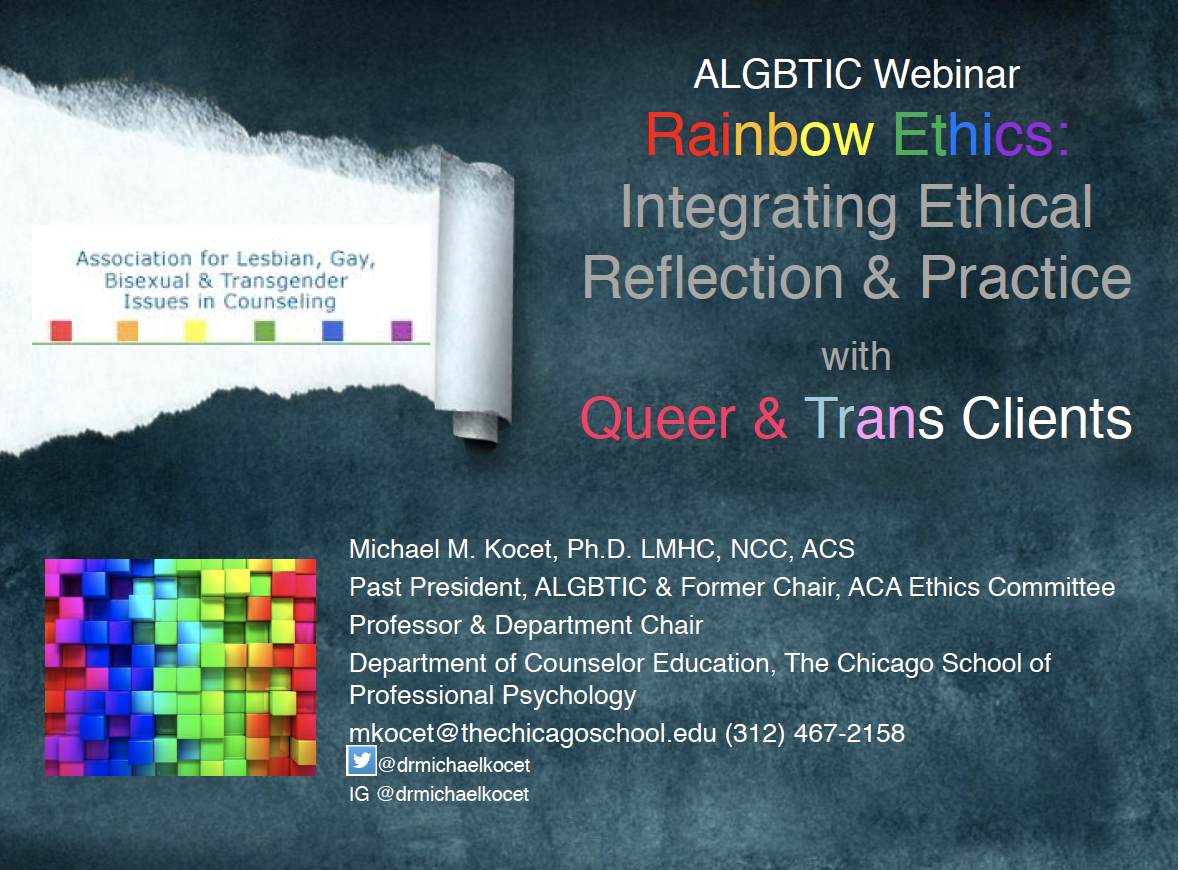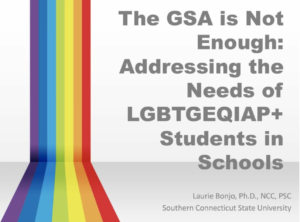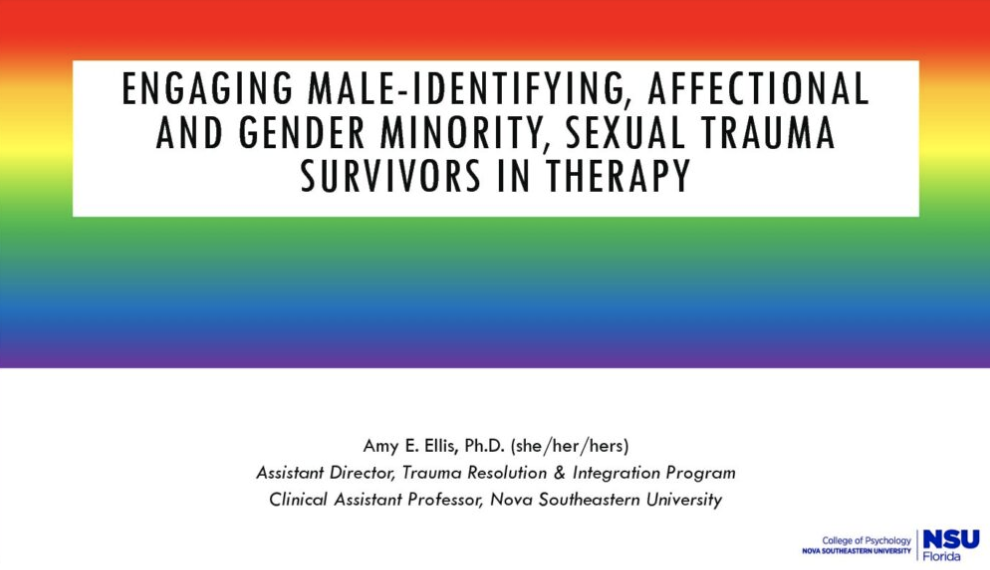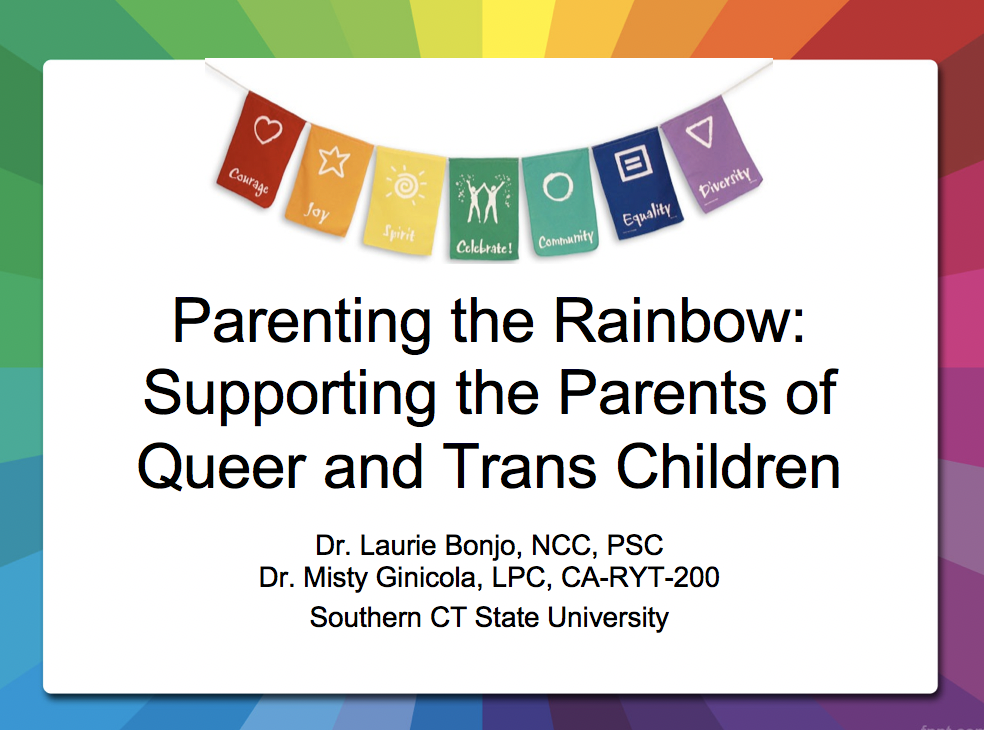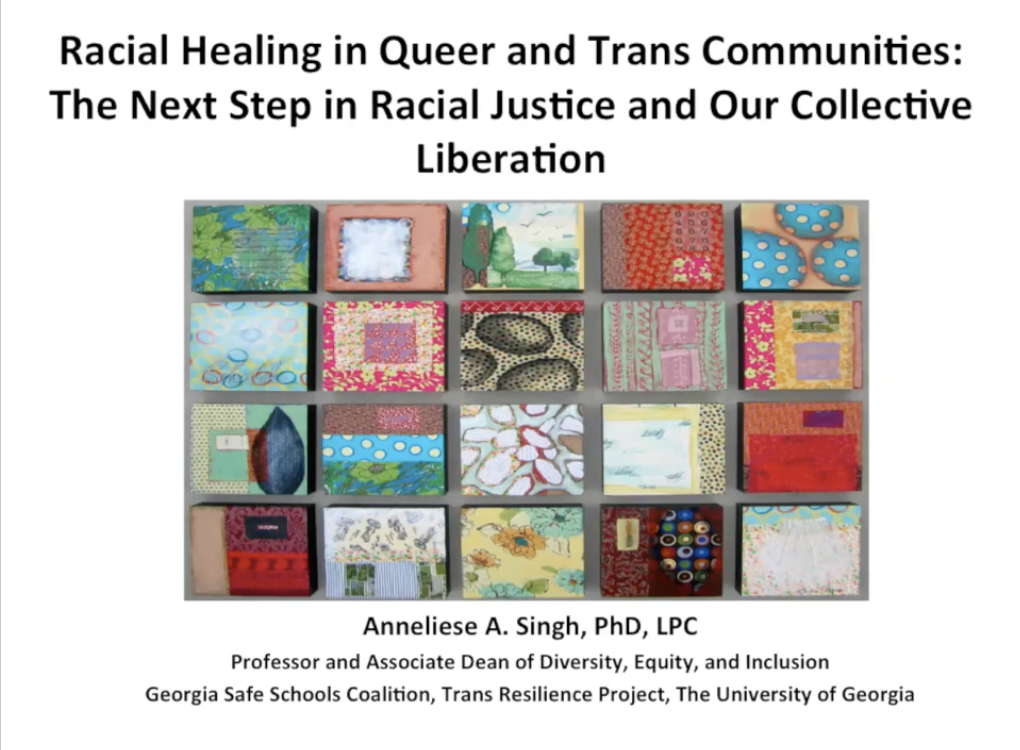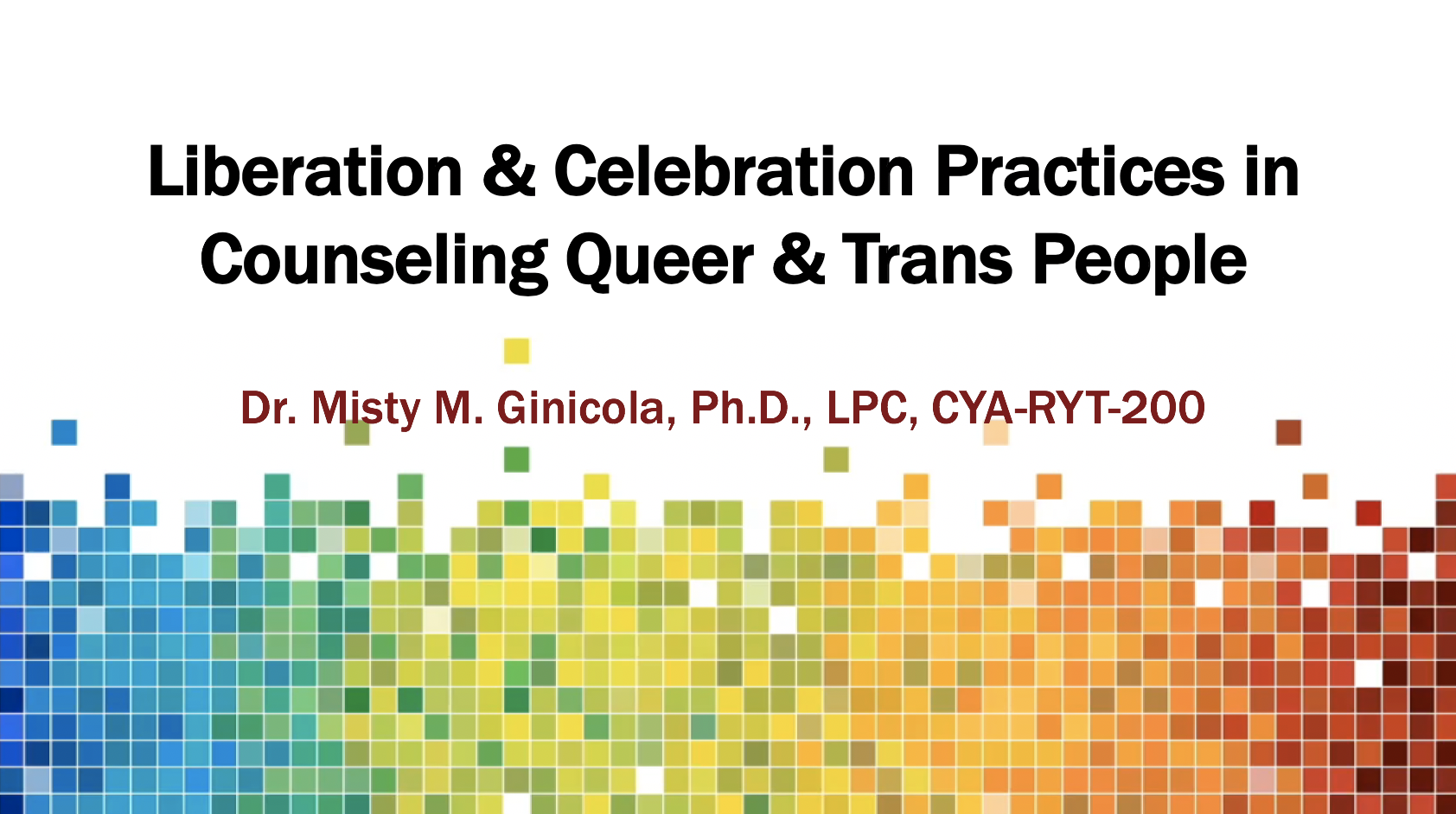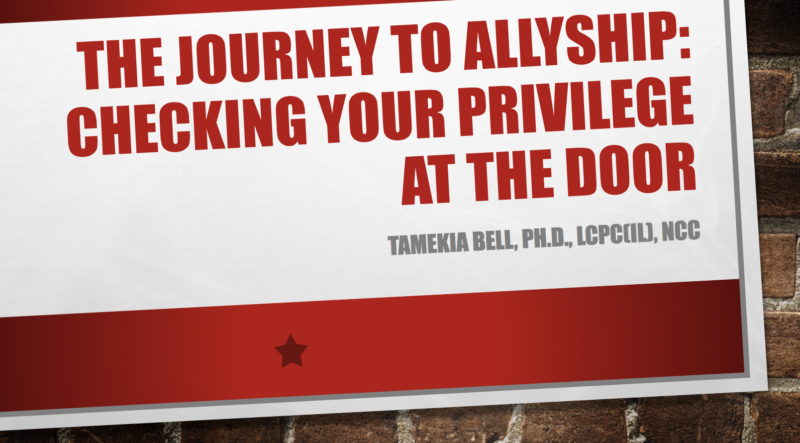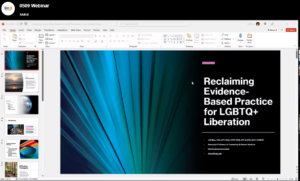Training Video Access for Non-Members
If you are not a SAIGE member, you can still gain subscriptions to our videos to show them to your colleagues, students, or supervisees, you may purchase access through our website and can access the video on-demand through our online portal.
If you are a counselor educator and would like to embed the videos directly into a learning platform (e.g., BlackBoard), first purchase the video, then email [email protected] to request the embed code.
We cannot provide CEs for remote viewing not linked to our online courses or webinars, but we encourage members and non-members to use them for training purposes at their sites or classes!

Video Access for Non-Members
If you are NOT a SAIGE Member, the cost of access to our videos is $25.
Words Can Hurt: Staying Competent in LGBTGEQIAP+ Terminology
Is it sexual or affectional orientation? What is asexual, pansexual, genderqueer? What does the GE stand for? When working with LGBTGEQIAP+ people, the terminology is not only expansive, it has changed quickly, leaving many counselors and mental health professionals unsure of appropriate terms and their meanings. Using outdated, stigmatized terms can cause harm to clients, the therapeutic relationship, and the client's view of counseling. This interactive webinar educates both new and seasoned professionals on the most updated terms, as well as problematic terms to avoid.
Comments from our Evaluations:
- Learned things I didn't know and it made me think about changes I can make to my communication.
- Incredibly informative and presented in a way that was engaging and easily digestible
- Loved the presence and delivery of the speaker as well as the wealth of information provided
- I loved how easy it was to follow and informative. I really appreciated the information on brain and development to share with parents as well.
- The instructor did a great job of breaking down various terminology and concepts in easy to follow slides.
Rainbow Counselors: Becoming Competent in Affirmative & Celebratory Counseling with Queer & Trans People
What does it take to be competent to work with LGBTGEQIAP+ people? Many mental health specialists are open to working with Queer and Trans people, but openness does not translate to competence. Within this workshop, participants will learn how self-awareness, knowledge of client’s lives, privilege, marginalization, advocacy, and specific affirmative, liberatory, and celebratory counseling skills are needed to provide quality counseling to LGBTGEQIAP+ people. Using ALGBTIC competencies, participants will identify where they currently are on their continual journey of learning and building competence when working with LGBTGEQIAP+ people.
Comments from our Evaluations:
- Amazing, comprehensive, and very useful information.
- It was informative. It was helpful. It was positive and educational. I loved it. I just spent four years in a location that did not practice this way and this was so healing to hear all of this.
- The content was excellent and informative. The speaker was very knowledgeable, and presented very well. Clear and fluid.
- I appreciate the non-judgmental and informative style of presentation. For those who are still learning, the material was presented in a way that simply encouraged a new practice rather than shamed older practices.
- The depth of knowledge shared and the direct applicability of this to my work as a practicing counselor and counselor educator.
Beyond the Binary: A Primer for Counseling Transgender and Gender Expansive People
Very often mental health professionals are not feeling prepared by their graduate programs to work with trans and gender expansive (TGE) people. With numerous gender identities, changing terminology, and recent scientific discoveries surrounding gender, it is incredibly important that counselors continue to stay up to date. New and seasoned professionals alike must continue to develop awareness and understanding of TGE clients, as well as strategies and skills for a trans-affirmative counseling practice. This workshop will help any mental health professional start their journey towards competence in working with this population.
Comments from our Evaluations:
- I really enjoyed the overall knowledge and presentation in general. The presenter was personable and connected the topic directly to the profession which is a reminder of our professional values and the larger picture of this work.
- Went far beyond “trans 101” to provide excellent education on gender expansive issues, history, and ethical practice.
- It was informative hearing about the process of writing letters for clients who want HRT and how to make yourself and your office more affirming for this population.
- I appreciate that the webinar was facilitated by a trans person. It's really important to me to center LGBTQIA+ voices in education, especially when we are talking about lived experience and community.
Rainbow Ethics: Integrating Ethical Reflection and Practice in Working with Queer & Trans Clients
This webinar examines the 2014 ACA Code of Ethics and how to help LGBTQ+ affirming counselors to foster deeper ethical reflection into counseling practice in a variety of settings with LGBTQ individuals. This webinar will focus on managing professional boundaries with LGBTQ+ clients, the role of values and ethical bracketing in the therapeutic process, the unethical practice of reparative therapy, social media, and what it means to practice ethically and competently as an LGBTQ+ Professional Counselor. 2 CE Credits.
Comments from our Evaluations:
- The speaker was very interesting and I enjoyed the interactive aspect. The examples of actual things that could come up in therapy, and all the input of solving these issues.
- Interactive and real life examples encouraging participation and thinking through various scenarios. Getting a different perspective and gaining new language for some skills and tools.
- I really enjoyed seeing different ethical considerations other than just state licensing and federal. It was an important reminder to check with all the organizations and certifications I have and how to look into all their codes of ethics. The presenters ability to share personal experiences and disclosures was of value.
A GSA is Not Enough: Supporting Queer & Trans Youth in Schools
A substantial body of research supports the implementation of GSAs in schools. However, LGBTGEQIAP+ students may still encounter numerous barriers and these unmet needs can limit their success in academic, personal-social, and career domains. How can we support the school in implementing systemic shifts that will create a culture and climate of inclusion for LGBTGEQIAP+ students? What can we do to help students who come from families where one or more family members are not accepting? This interactive webinar educates both new and seasoned professionals on actions that can be taken to support LGBTGEQIAP+ students at the institutional level through systemic practices, at the group level by using proximal interventions, and also at the individual and family level by using a flexible and simple tool developed by the presenter for working with LGBTGEQIAP+ students and their families.
Comments from our Evaluations:
- Very competent and engaging presenter!
- A lot of good information about how to make schools safer for students.
- I really valued all the information and topics covered. The resources were helpful and I am very excited to bring them back to my administrator and start implementing.
- Lots of great information to be aware of as a private practice clinician in collaborating with school counselors and for LGBTQ youth.
Engaging Male-Identifying Affectional and Gender Minority Sexual Trauma Survivors in Therapy
One in four men are sexually abused in their lifetime, though this may be grossly underestimated given the prevalence of stigmatization against male rape. In addition, affectional and gender minority (AGM) individuals are disproportionately affected by sexual trauma. Thus, male-identifying AGM individuals are at heightened risk for adverse outcomes, and necessitate nuanced approaches to counseling. This webinar will explore treatment engagement strategies for those individuals with sexual traumatization, with a focus on the unique intersection of male gender identity and AGM status.
Comments from our Evaluations:
- I feel more confident as a counselor having attended this webinar.
- I really got engaged in the presentation when the skills and interventions yielded clarity using the scenarios. I gained a lot of insight into the world of AGM folx with those and the two hypotheses.
- The presenter was extremely knowledgable and the information is important for all clinicians.
- Dr. Ellis' personality was shining through the entire time which helped draw my attention to the content of her presentation. I loved her emotion when it came to the rights of the trans community and how counselors should be treating these folx in the world.
Parenting the Rainbow: Supporting the Parents of Queer & Trans Youth
As counselors working with LGBTQI+ clients, we often only focus on our individual client, helping them to cope with and respond to reactions from family members. However, as queer and trans clients are coming out at younger ages, part of our work can be to assist families in understanding their children and to become affirming, which is linked to significantly lowered suicide risks. This interactive webinar helps prepare counselors to support family members through their journey and helps to guide them in becoming an affirming and supportive advocate for their children.
Comments from our Evaluations:
- Both presenters were clearly passionate and knowledgeable and I learned some great strategies for working with families.
- Hearing from people with experience both as parents and professionals and also non-binary/Two Spirit/queer identities was extremely helpful as well as being affirming as a non-binary professional.
- Everything was excellent. I really appreciated the hands on aspect of how to work with parents separate from the child so that the parent can evacuate all toxicity and biases before engaging with the child.
- Comprehensive information and easy to use language for discussing gender with family and youth. I am especially excited to share a parallel developmental process with the families I serve. I've talked about this but not as clearly as I will be able to now.
Racial Healing, Justice, & Liberation in Queer & Trans Communities
In this webinar, Anneliese Singh describes core strategies of racial healing that queer and trans people of color and white people can engage in to build toward collective liberation and racial justice. Attendees will have the opportunity to explore their own racial healing in order to be able to work more effectively with clients across multiple races/ethnicities and more effectively challenge structural racism within institutional settings.
Comments from our Evaluations:
- I enjoyed the speaker, Dr. Singh, very much! She gave me some great tips to begin my racial healing journey. I feel motivated to begin taking steps now so that I can be a better counselor during practicum, during internship, and in my practice!
- I loved ways the presenter was able to incorporate her unique experience and discussion of intersectionality into the content of the lecture.
- I thought the speaker was very intentional and invited the attendees into a nice reflective space. It challenged me to think about my own identity and the systems I live within and perpetuate.
Liberation & Celebration Practices in Counseling Queer & Trans People
Uncovering the history and impacts of colonization on queer & trans people is incredibly important for counselors serving these populations. Building upon the quintessential work of Dr. Anneliese Singh, this workshop will provide a review of how indigenous healing practices and beliefs were colonized in the foundation for modern psychology, and how decolonizing work can be healing for all clients. Liberation, empowerment, and celebration approaches and specific practices will be discussed. Counselors will learn why decolonization is important to multiculturally competent practice and social justice, as well as how to move past affirmative approaches in counseling to liberation and celebration.
Comments from our Evaluations:
- Excellent content & many insights developed.
- The presentation of the material was excellent. I especially appreciated some of the recommended resources and plan to look back on the power point to follow up on those.
- The entire program was thought provoking. I appreciate the history, impact and suggestions for both myself and in serving others.
- Very helpful information with useful ways to practice liberation and celebratory techniques
The Journey to Allyship: Checking Your Privilege at the Door
Am I not already an ally if I affirm LGBTGEQIAP+ people? What does it mean to ally for others, as a verb? What is an accomplice? The ally journey involves understanding the role of an ally, having an honest and open dialogue about coming from a place of privilege, and possessing the knowledge and action to move past simple affirmation and show allyship in your approach and practice. Through stories of the presenter’s experiences and lessons learned in being a true ally, this webinar will educate new and seasoned counseling and related mental health professionals on what it means to ally, as well as how to cultivate allyship in others.
Comments from our Evaluations:
- Models covered very nicely and providing the resources info lets me go to the article source to learn more. Sharing your story helped me understand with your examples. Also, as cis/het myself hearing your process was helpful as I work to grow and negotiate striving to be an ally towards hopefully accomplice.
- Speaker was very open and genuine, willing to talk about mistakes made in her journey to allyship. I think it is important that we are transparent about these things with our students so they understand that it takes work and effort.
- The humility of the presenter was refreshing. Intersectionality is really what it is all about.
Reclaiming Evidence-Based Practice for LGBTGEQIAP+ Liberation
For this webinar, the presenter will provide an overview of Evidence-Based Practice, Practice-Based Evidence (PBE), and Community-Defined Evidence (CDE), three complementary paradigms for assessing the validity of counseling interventions engaged with and on behalf of LGBTGEQIAP+ clients and communities. A model for critically evaluating EBPs using PBE and CDE lenses will be presented so that attendees can assess both the efficacy and the ecological validity of interventions in support of LGBTGEQIAP+ liberation.

